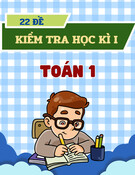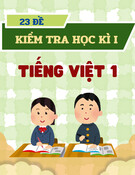
1
Điểm bằng số
Điểm bằng chữ
Giám khảo 1
Giám khảo 2
Mã phách
PART A: LISTENING (5.0 pts)
Section I: Listen and circle the correct answer A, B or C. (You will listen to the tape twice)
1. When did Gary start his new job?
A
B
C
2. What time does the film start?
A
B
C
3. What was the weather like on Saturday?
A
B
C
4. Which motorway will they take?
A
B
C
PHÒNG GIÁO DỤC VÀ ĐÀO TẠO
THI CH N H C INH GI I P 9
HUYỆN ĐỨC PHỔ
C P HUYỆN, NĂM H C 2016-2017
Môn thi : Tiếng Anh
Th i gi n m b i 15 ph
ĐỀ CHÍNH THỨC

2
5. Which book does Lorna want?
Your answers
1
2
3
4
5
Section II: Listen to Sarah talking to a friend about her holiday photographs. What place
is each person in? Write the name of the places in the gaps.
(You will listen to the tape twice)
Caroline
Jack
Sarah
Peter
Sarah’s father
(6)…………..……
(7)…………..……
(8)………..………
(9)…………..……
(10)………………
Section III: Listen to Rose talking to Steve about her day. What is Rose going to do at
each time? For questions 11-15, write a letter A-H into each suitable box.
(You will listen to the tape twice)
EXAMPLE
0.
9.00 a.m
E
TIME
ACTIVITIES
11.
10.00 a.m
A
have an Art lesson
B
have lunch
12.
11.00 a.m
C
help Steve
13.
12.00 a.m
D
meet Bill
E
see doctor
14.
1.00 p.m
F
see teacher
15.
2.00 p.m
G
study
H
swim
A
B
C

3
Section IV: Listen to five conversations and give short answers.
(You will listen to the tape twice)
EXAMPLE
0.
How many people were at the meeting?
_____30_____
16.
What colour is Kathy’s bedroom now?
____________________
17.
Which platform does the woman’s train leave from?
____________________
18.
How is Susan going to get to the airport?
____________________
19.
Who has blonde hair in Anna’s family?
____________________
20.
When is Kim’s birthday party?
____________________
PART B: READING (5.0 pts)
Section I: Circle the correct answer A, B, C or D that best fits the blank space in the
following passage.
English is the most important language in the world today. A very large (21)….…. of
people understand and use English in many countries of the world. Indeed, English is a very
useful language. If we speak English we can go to any place or country we like. We shall
not find it hard to (22)……….. people understand what we want to say.
English also helps us to learn all kinds of subjects. Hundreds of books are (23)….….. in
English every day in many countries to teach people many useful things. That English
language has therefore helped to spread ideas and knowledge to all the corners of the world.
There is no subject that cannot be taught in English.
As English is used so much everywhere in the world, it has helped to make the countries
in the world become friendlier. The leaders of the world use English to understand one
another. The English language has therefore helped to spread better understanding and
(24)………….. among countries of the world.
Lastly, a person (25)………. knows English is respected by people. It is for all these
reasons that I want to learn English.
21. A. few B. deal C. amount D. number
22. A. get B. let C. persuade D. make
23. A. published B. wrote C. print D. made
24. A. friend B. friendly C. friendship D. friendliness
25. A. what B. when C. who D. will
Your answers
21
22
23
24
25
Section II: Insert these sentences A, B, C, D and E into the passage.
CLOTHES FOR WORK AND LEISURE
…..(26)…... .It is not difficult to decide if someone is a police or a traffic officer, a
nurse, or a fire-fighter; these people all wear uniform at work. Even when people don’t wear
uniform, most jobs have their own type of clothes. …….(27)….. .Similarly, builders and
road workers don’t wear suits and ties! …..(28)…. . Until fairly recently, working

4
people couldn’t afford many clothes; only the rich had lots of clothes when they were at
work and when they were not at work. The clothes they wore in might be the only clothes
they had, so wearing aprons was probably the first clothes which were worn especially for
work; they were used in several jobs for keeping clean and for holding tools and carrying
things.
When people are not at work, they like to relax. ..…(29)….. .They wear clothes
that are comfortable and easy to wash.
Sports clothes have not always been comfortable and easy to move around in. In the
1880s women played tennis in long skirts, tight jackets and hats! ……(30)…. . Their long
skirts caught in the wheels. So they began to wear trousers for cycling.
A- Some people play sports, some go on long walks, some sit and rest.
B- Bank managers don’t usually wear T-shirts and trainers to work, for example!
C- At the beginning of the 1900s women wanted to ride bicycles.
D- Clothes can often tell us what a person does, either for a short time, like being a
guest at a wedding or a walker in the country, or more permanently in his or her
daily work.
E- Instead they wear boots to protect their feet, helmets to protect their heads, and
jeans and T-shirts because their work is very dirty.
Your answers
26
27
28
29
30
Section III: Read the passage and fill in each gap with ONE suitable word.
The country is (31)…………... beautiful than a town and pleasant to live in. Many
people think so, and go to the country for the summer holidays though they cannot live here
all the year (32)……………. Some have a cottage (33)……….. in a village field that they
can go there whenever they can find the time.
English villages are not all alike, but in some ways they are not very different from each
other. Almost every village has a church, the round and square tower of which can be seen
from many miles around. Surrounding the church is the churchyard (34)……………. people
are buried.
The village green has a wide stretch of grass, and houses or cottages are next to it.
Country life is now fairly comfortable and many villages get water brought through pipes
each day.
Most villages are so close to some small towns and people can go there to buy
(35)…………. they can’t find in the village shop.
Your answers
31
32
33
34
35
Section IV: Read the passage and circle the correct answer A, B, C or D.
One of the most urgent environmental problems in the world today is the shortage of
clean water. Having clean drinking water is basic human right. But acid rain, industrial
pollution and garbage have made many sources of water undrinkable. Lakes, reservoirs and
even entire seas have become vast pools of poison. Lake Baikal in Russia is one of the

5
largest lakes in the world. It contains a rich variety of animals and plants, including 1,300
rare species that do not exist anywhere else in the world. But they are being destroyed by
the massive volumes of industrial wastes which pour into the lake every day. Even where
law existed, the government did not have the power to enforce them. Most industries simply
ignore the regulations. The Mediterranean Sea occupies 1% of the world’s water surface.
But it is dumping ground for 50% of all marine pollution. Almost 16 countries regularly
throw industrial wastes a few miles off shore.
Water is free for everyone. A few years ago people thought that the supply of clean
water in the world was limitless. Today, many water supplies have been ruined by pollution
and sewage. Clean water is now scarce, and we are at last beginning to respect this precious
source. We should do something now.
36. According to the passage, one environmental problem in the world today is ____.
A. acid rain
B. safe water shortage
C. industrial pollution
D. population explosion
37. Which of the following is NOT the reason that makes water undrinkable?
A. acid rain
B. garbage
C. industrial pollution
D. high cost
38. What is the serious problem of Lake Baikal in Russia?
A. It contains a rich variety of animals and plants.
B. It is polluted by massive volumes of industrial wastes discharged into it.
C. It has 1,300 rare species that do not exist anywhere else in the world.
D. The government did not have the power to enforce laws and regulations.
39. How many countries throw industrial wastes into the Mediterranean Sea regularly?
A. exactly 16
B. exactly 15
C. nearly 16
D. less than 15
40. What is the message to the readers?
A. We should take action to protect our water resources.
B. We should take all water resources into account.
C. We should limit the use of water resources.
D. We should encourage people to use safe water.
Your answers
36
37
38
39
40
PART C: WRITING (5.0 pts)
Section I: Look at the following picture and describe it in 80 - 100 words. Using your own
words and the words given. (2.0 pts)






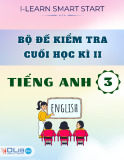
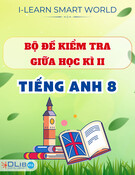
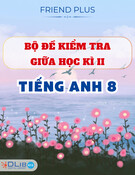
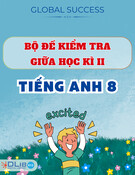
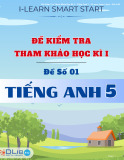

![Đề thi Tiếng Anh có đáp án [kèm lời giải chi tiết]](https://cdn.tailieu.vn/images/document/thumbnail/2025/20250810/duykpmg/135x160/64731754886819.jpg)
